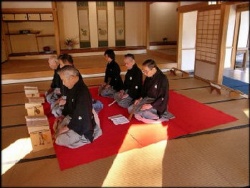Difference between revisions of "Nichikan"
(Created page with "thumb|250px| <poem> Nichikan 日寛 (1665–1726) The twenty-sixth chief priest of Taiseki-ji, the head temple of the Nikko school...") |
m (Text replacement - "Category:Japanese terminology" to "{{JapaneseTerminology}}") |
||
| Line 10: | Line 10: | ||
{{R}} | {{R}} | ||
[http://www.sgilibrary.org/search_dict.php www.sgilibrary.org] | [http://www.sgilibrary.org/search_dict.php www.sgilibrary.org] | ||
| − | + | {{JapaneseTerminology}} | |
Latest revision as of 12:59, 27 April 2014
Nichikan
日寛 (1665–1726)
The twenty-sixth chief priest of Taiseki-ji, the head temple of the Nikko school (also known as the Fuji school), or what today is called Nichiren Shoshu, in Japan. He is revered as a restorer of Nichiren's teachings because he worked to clarify their true meaning. His father was a retainer of the lord of Maebashi in Kozuke Province, and his childhood name was ItoIchinoshin. Around age fifteen, he moved to Edo (now Tokyo) and served at the residence of a direct retainer of the Tokugawa shogunate. In 1683, however, he entered the priesthood and studied under Nichiei, the twenty-fourth chief priest of Taiseki-ji. Thereafter he devoted himself to the practice and study of Nichiren's teachings, and in 1689 entered Hosokusa Seminary in Kazusa Province, where priests were instructed in Nichiren's teachings. In 1708 he became head of the seminary and took the name Nichikan. In 1711 he was appointed the chief instructor of Taiseki-ji by Nichiei.
During the four centuries after Nichiren's death, a number of errors and misconceptions had arisen as his followers split into many schools, beginning with the dissension of the five senior priests, whom Nichiren had designated as his senior disciples along with Nikko, his successor. Nichikan worked tirelessly to clarify the true meaning of Nichiren's teachings. He completed exegeses on Nichiren's five major writings and other works, and authored The Six-Volume Writings, which distinguishes the correct interpretations of Nichiren's teachings from misleading ones. He thus contributed greatly to the doctrinal clarification and study of Nichiren's teachings. In 1718 Nichikan became the twenty-sixth chief priest of Taiseki-ji, and in 1720 he retired from that post and devoted himself solely to lecturing on Nichiren's works and instructing priests. Three years later, however, the chief priest who had succeeded him died, and Nichikan again assumed that responsibility. He also collected funds and promoted the repair and construction of buildings at Taiseki-ji.
